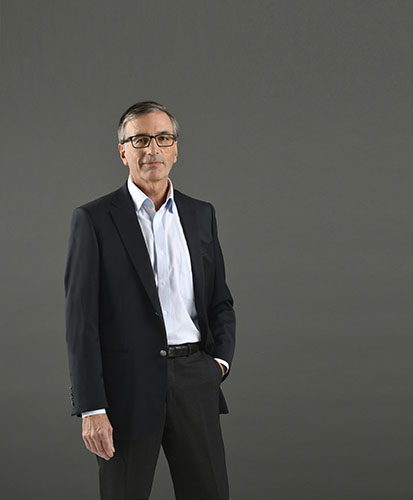
The Linxis Group brings together five suppliers from the international baking equipment industry. Everyone acts independently. Specialist groups ensure the overall coordination and development.
Hildegard M. Keil: 2017 Bretèche Industrie became Linxis Group with the idea to become a world leader in specialized equipment for pharmaceutical, food and specialty baking industry. How have your progressed toward that goal?
Linxis Group: Linxis Group is comprised of 5 marketleading companies in the Food and Health industries. While our position of strength can vary from one segment or region to another, our brands are recognized world-wide for their expertise and premium positioning. In that sense, we are quite pleased with our progress toward the goal but still have lots of work ahead.
Keil: Your portfolio combines Diosna, VMI, Shick Esteve, and Unifiller – Do you see these companies as one homogeneous company with different specializations or are they rather individual companies that work independently of one another and are sometimes even competitors?
Linxis Group: The answer to both questions is definitely “yes!”. As for what we “are”- we are focused on providing needed expertise in the critical steps of the manufacturing process for our food and healthcare customers. In the delivery of these process solutions we may act as individual companies, or we may work in concert to provide a seamless system. In this way, it allows us to foster the entrepreneurial spirit of our brands while also enabling us to come together as one company for our customers when there is value. For Linxis Group, we will always place the highest importance on allowing the individual brands to focus on market leadership. In this way, they can do what is best for their customers – including managing their cooperation with internal and external partners.
Keil: How far do the companies coordinate with each other, is there a central management level, for example in sales, services and development?
Linxis Group: Our organization is mostly decentralized. We have a small and agile Linxis holding team (12 people), focused on the central elements of group structure (Finance, Legal, Information Systems, Human Resources). Within that framework, we have initiatives that promote the synergies created by working together. We promote active professional communities wherein members of the Linxis team and managers from the subsidiaries are actively involved in developing best practices and implementing transformative projects.

Tim Cook, Vice President of Linxis Group and CEO of Shick Esteve
Keil: Can you explain to us which of the bakery-specific process steps are located at which company?
Linxis Group: Shick Esteve operates in dry and liquid ingredient automation from storage to dosing, including process control and traceability. Diosna offers fermentation, pre-mixing and kneading solutions, combined with sourdough strains developed by its Baking Center. Diosna serves both the food and the pharma industries. VMI provides premixing, kneading and mixing solutions in batch and continuous processes. They serve the food and cosmetic industries. Unifiller offers dosing, depositing, filling and decorating equipment for the food industry.
Keil: With the takeover of Unifilller, you wanted to strengthen your position in the cake and pastry industry and your presence in North America, according to your 2018 annual report. Did you succeed?
Linxis Group: The cake segment has experienced satisfactory growth and we are seeing increased opportunity as Unifiller cooperates with our other brands to leverage their strength in various markets and regions of the world.
Keil: What are the Linxis Group’s development priorities with a view to iba 2021?
Linxis Group: While each of our brands will be working on various R&D projects to be showcased at IBA 2021, the priority of the group will be to continue to enhance our ability to support our customers globally. Our goal is to offer integrated solutions and local support to our customers wherever they operate around the world. This will include not only continued expansion of facilities but also enhanced offerings in 24/7 technical support and remote access.
Keil: In times of increasing digitalization and automation, it is no longer just about mechanical engineering, but also about increasing efficiency by networking the entire process. This topic cries out for cross-product collaboration and development. How far are the Linxis Group and its brands on this topic and what are the goals of your development in detail?
Linxis Group: Our customers expect seamless integration across our brands when they are used in a system. Fortunately, cross-product-collaboration and development is a strength of our group. As leading brands, our companies were already very used to collaborating with other suppliers in order to deliver value for our customers. Within the group, that skill is taken to a new level. Our engineering teams and project management teams know each other and know they can freely collaborate and have the same goal of efficiently delivering the best solutions for our customers.
We have seen this in action already on many projects where we connect controls platforms and develop protocol for the way we interface with one another. Across the brands our teams have a deep understanding of the way each company is working and with whom they need to collaborate to achieve the desired outcome for a specific project. This collaboration takes place in multiple ways:
• For efficiency between companies. For example, prior to combining Shick and Esteve there were primarily two different controls platforms used; Shick was predominately Rockwell and Esteve was predominately Siemens. Now both companies have staff with proficiency in both so that we can help each other in supporting our common customers.
• For integration on a project. We have witnessed already projects where customers want a seamless integration between multiple brands. In these cases, we are able to assign a lead person for the controls integration and even have one common project manager who takes the lead on the project. This allows us to work as one company on behalf of our customers so that connection and field issues are minimized prior to the installation of the equipment.
• For efficiency of effort as an organization. As each brand was developing their own methodology around IIOT, we realized that we would be more efficient if we developed a common IIOT road map for the group. Of course, it also benefits our customers. This begins with a common understanding of what is achievable, what is desirable and what is justifiable. It also allows one brand to take on development work on behalf of the entire group. In this way, our Linxis IT Manager works continuously with our group subject matter experts to develop the strategy around our IIOT offering.
Finally, collaborating in this way allows us to offer seamless solutions across multiple brands, increases our own efficiency and leads to enhanced sharing of best practices within our group.

Keil: How do you see your customers’ attitudes towards this topic? Plant control can be manual, based on algorithms or artificial intelligence. In bakery technology today, control is largely based on algorithms. Is the input of data provided by the sensors sufficient? Where do we need more knowledge about the interrelationships? Where do we need more sensor technology and where would it make sense to use AI? What would be the criteria for success?
Linxis Group: As you might imagine, attitudes vary greatly on this subject depending on the industry and the individual customer. While some stay focused on the topics of automation and traceability, others are interested in exploring areas of production data collection and even preventative or predictive maintenance. Certainly, we see that the pharma and cosmetic industries have a high level of desire for traceability and for process validation.
Bakery customers understand the value of traceability from ingredient handling through to the final packaged product. However, they have been very slow to invest in the type of network data collection that would allow for continuous monitoring of all aspects of production. But, we believe that this resistance to adaption is not because of what is technologically available to them but, rather, what is economically feasible and operationally understandable.
We think one area of great interest is the use of simple IIOT for preventative and predictive maintenance. A simple example: we have the ability to communicate through the cloud to let the appropriate personnel know when the filter in a flour transfer system is nearing end of service. This message communicated to the appropriate maintenance personnel in the appropriate way (iPad, Smartphone, Desktop), would allow them to change the filter prior to it causing down time. The capability exists – but the baker must decide whether it is worth investing in and maintaining this feature. If the maintenance crew already has too many “blinking red lights” one more may not be productive. Likewise, many bakers will say that they expect their maintenance crew to change filters on a regular maintenance schedule and so do not want to pay extra $$ to automate the process further. However, preventing run to failure mode in bakeries can lead to increased uptime and greater efficiency.
This is a very simple example but when you multiple this example by each opportunity and each vendor it can very quickly become difficult to digest and, we believe, that is what is making the available technology a challenge to adapt.
Keil: Can digitalization and automation of bakery production be economical in view of an often outdated machinery and a constantly changing variety of types and batch sizes like in the baking industry?
Linxis Group: Yes, it can be economical in the right situation. However, challenges still exist. If we have multiple equipment vendors offering multiple solutions, how is the data communicated in a common way? How then is that data collected and appropriately interpreted by or for the baker. Further development needs to happen before this becomes a more accepted concept. For sure companies are working on solutions to these challenges and, one day, it will become common practice.
In the case of outdated equipment upgrades or controls it is possible to upgrade the entire system but may require additional investment to first upgrade the line. This, of course, makes the operation more difficult to justify; however, the upgrade of existing system is often necessary regardless of the move to further digitalization.
Keil: At the moment, the whole world is shaken by the Corona crisis – what effects will this have on the baking industry and its suppliers in the medium term in particular, the machine and plant manufacturers?
Linxis Group: Of course, until we can see an end to this crisis it is difficult to determine the totality of affect it will have. Certainly, we can see some sectors of the baking industry are affected worse than others and consequently the same is true for the suppliers. Foodservice is suffering terribly from the closing of restaurants and other “quick serve” food outlets. Meanwhile, retail sales are hitting all-time highs for production and sales.
In the medium term we expect to see delays in project installations, increased safety and sanitary concerns and an increased desire for local and/or remote service capability.
The Linxis brands have remained opened for business during this crisis with an emphasis on supporting our customers while they take on the critically important task of feeding the world.
Keil: Are you ready to buy additional companies and from which areas of the bakery machine
Linxis Group: Linxis Group’s mission is to continue to grow in its key Food and Health markets. This requires organic growth in our companies, but also acquisitions.
We are looking for acquisitions that will make sense in our development strategy. We have several objectives and identified opportunities, either to increase our market share, to improve our competitive positioning, or to increase the value of the company we wish to acquire.
The turbulent period we are living in makes it more difficult to predict where opportunities will come from but, we are convinced that new opportunities will arise that will allow Linxis to continue its growth.
Keil: Many thanks for the interview.


